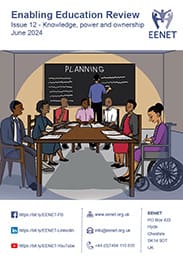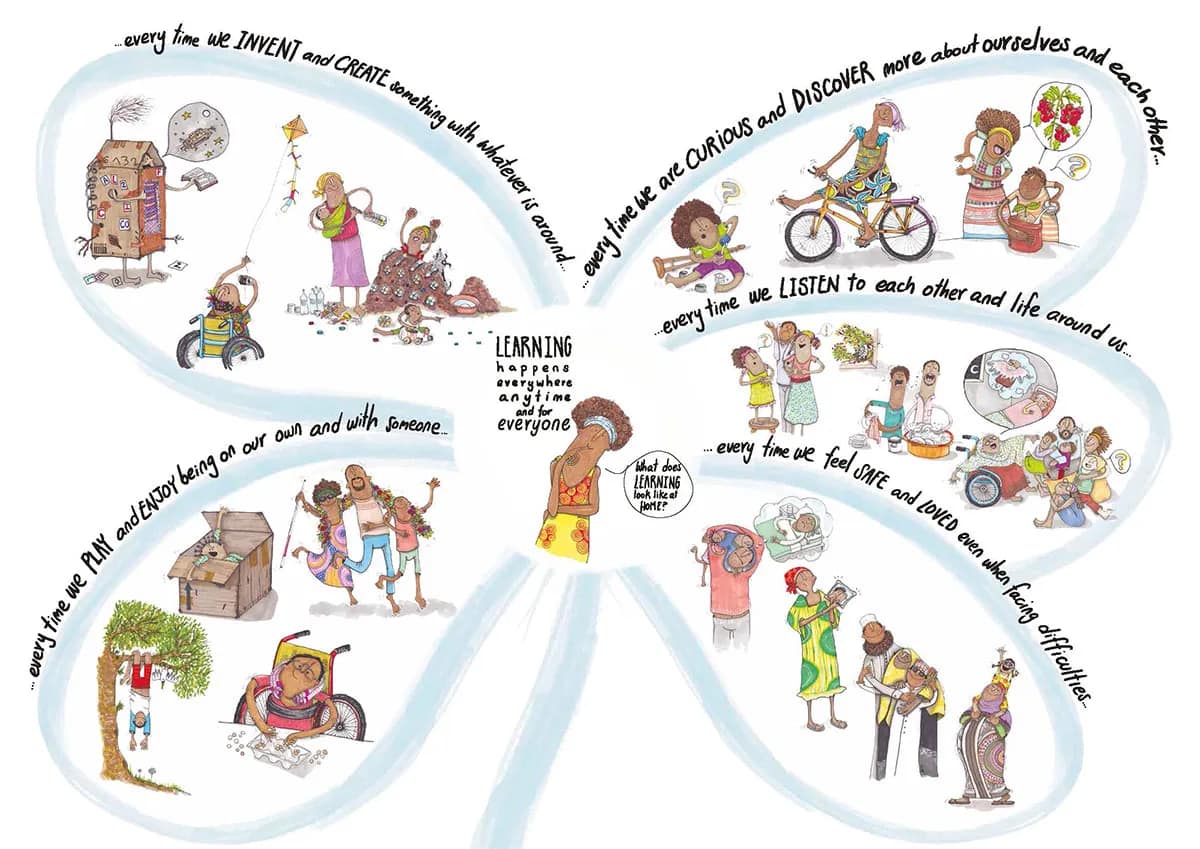The 12th issue of the Enabling Education Review is already available. This is an issue of a range of thought-provoking topics, all pointing to the ways in which we can work in innovative ways toward inclusive education and development, in equal measure, and securing locals in the driver’s seat.
Here’s a sneak peek into the enriching articles and reflections inside EER Issue 12:
Featured Articles
1. Developing training on trauma-informed approaches for practitioners working with street-connected children
Santigie Bayo Dumbuya, Alfred Kargbo, and Lauren Kinnaird describe collaborative efforts underway in Sierra Leone to create training resources that local practitioners can design and deliver. Learn how these efforts have made a difference for street-connected children.
2. Preserving the syllabic approach to Hausa reading instruction in Northern Nigeria
A discerning contribution by Mikailu Ibrahim shows how a syllabic approach to literacy teaching, attuned to the linguistic features of Hausa, has been proving more effective than traditional English-centric ways of teaching.
3. ‘Doing rather than claiming inclusion’?
Veera Mookerjee shares a story about the pitfalls of superficial equity, diversity, and inclusion policies in educational institutions. Read about the policies’ actual impact and what real inclusion should look like.
4. Public participation and the competency-based curriculum in Kenya
Eunice Owino outlines the necessity of the public’s participation in implementing a new competency-based curriculum in Kenya. This paper reviews the efforts and successes of engaging multiple stakeholders to engender transformation in education.
5. Two projects, one goal: promoting learning through a love of music
Amanda Wrigley’s powerful contribution on using music to promote special educational needs and intergenerational relations shows how an inclusive creative activity could be a very useful tool for change.
6. Understanding young people’s agency globally
Ruth Edmonds unpacks ideas about ‘ambiguous agency’ and the necessity of young people\’s decision-making within its cultural context. This paper unsettles our assumptions of how we work with young people to engage their agency.
7. Colonialism and education in Afghanistan
Ian Kaplan and Mustafa Himmati provide a thoughtful critical review of neocolonial influences in Afghanistan’s education system over the past two decades. Their paper is an appeal for introspection into ways to offer more enabling conditions for local education practices.
8. Adaptation, inclusion, and the purpose of education
JRA Williams reflects on why adaptations in the system of education are needed so that global challenges related to climate change can be faced head-on. This article underlines the role inclusive values can play in facilitating meaningful and responsive educational experiences.
9. Sign Language interpreter as advocacy champion in Nigeria:
Yemisi shares her experiences as a Sign Language interpreter and advocate for deaf learners in Nigeria. The article highlights the challenges and successes in promoting inclusive education for the deaf community and emphasizes the role of interpreters in advocacy and education.
10. Power and personnel in education programmes:
Ingrid Lewis reflects on her 25 years of experience with INGOs and the inherent power dynamics that contradict the goals of inclusive education. She discusses how entrenched behaviours and systemic inequalities within NGOs and donor relationships can undermine efforts to develop inclusive education programs.
11. Reflections of a disabled education consultant:
Helen Pinnock shares her experiences as a disabled consultant in the aid sector, highlighting the conflicting power dynamics and the challenges of representing a disability perspective. She emphasises the importance of including disabled voices in education projects to avoid perpetuating systems that harm diverse learners.
12. Gaza: Education under occupation and war:
Dr. Mohammed Alruzzi discusses the impact of Israel’s occupation and war on Gaza’s education system, drawing from his personal experiences and research. He highlights the systematic destruction of educational infrastructure and calls for international action to protect Palestinian education rights under international law.
13. Supporting equal international relationships:
Su Lyn Corcoran examines the challenges of maintaining equal partnerships in international educational research and practice-based projects. She critiques the restrictions and conditions of overseas development aid that often privilege donor countries and hinder the autonomy of local partners.
14. Decolonising the curriculum in Nigeria:
Nnenna C. Amaonyeaso explores the impact of using foreign curricula in Nigerian primary schools. She argues for decolonising the curriculum to better reflect and empower local identities and cultural contexts. She calls for a transformative approach to education that prioritises the identity and value of the Nigerian child.
15. Reflections on perceptions and privilege:
An anonymous author reflects on the complexities of working in international development and the influence of privilege and perceptions on their role. They discuss the need to recognise and challenge power dynamics and to prioritise local voices and expertise in development projects.



